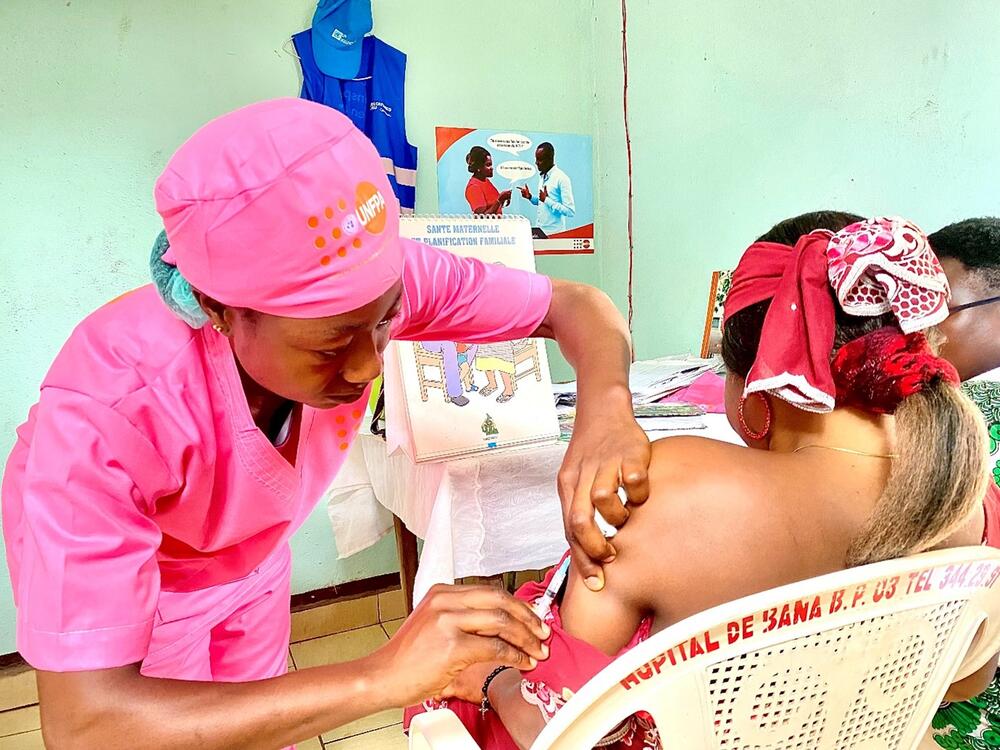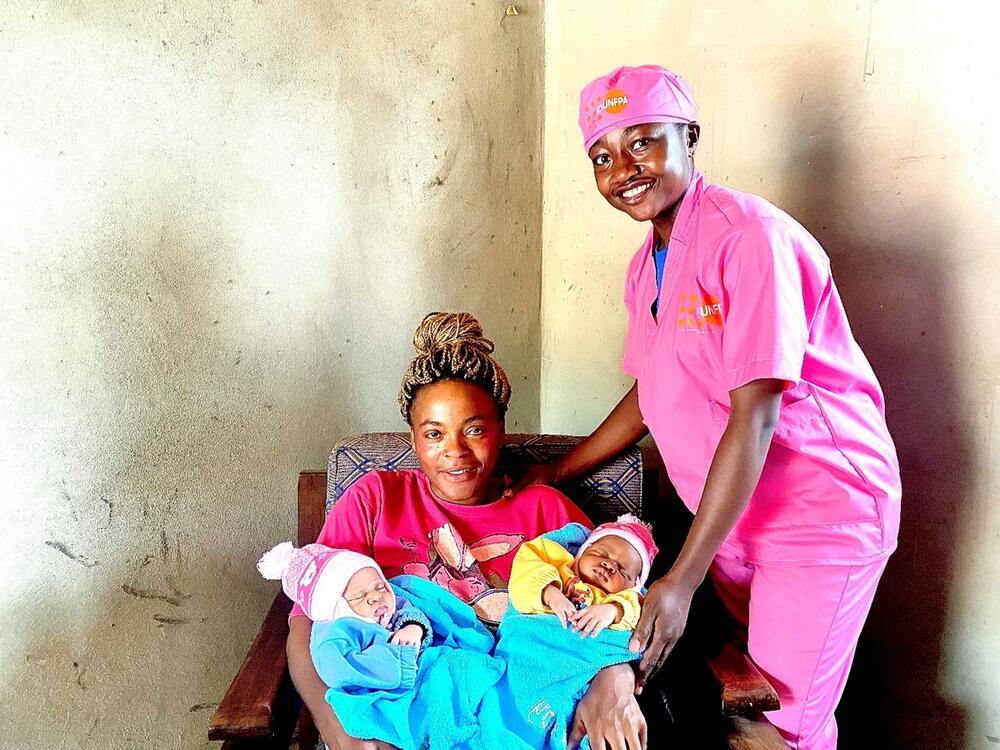News
Boosting trust and skilled birth attendance in Cameroon’s health facilities
- 02 October 2024
News
BANA, Cameroon – Toukam Mirabelle had been told that twin pregnancies hardly ever go beyond eight and half months, yet she was past even her regular due date.
Her first contractions arrived in the middle of the night, and she was forced to wait 11 hours until daybreak to go to the Bana Sub-Divisional Hospital – travelling in the dark would be too dangerous.
Western Cameroon is beset by climate crises and recurrent outbreaks of violence, so reaching any kind of health services can be fraught with difficulty – and at times life-threatening.
“By the time I got to the hospital, I wasn’t feeling any more contractions,” Ms. Toukam, from the village of Bakassa, told UNFPA, the United Nations sexual and reproductive health agency. “I was worried.”
Access to equipped and fully staffed health facilities cannot be assured in the region, and services such as family planning and gender-based violence response also suffer from a lack of resources.
Making it safely to the hospital wasn’t the end of Ms. Toukam’s ordeal, though: She needed to find her assigned midwife, Stella Tchiwobe.
“The nurses could only hear one heartbeat, the second seemed to be too weak,” she told UNFPA. “I had to call Ms. Tchiwobe to make sure she was next to me at this point – I needed her reassurance.”
Change in the air
Maternal death rates in Cameroon are some of the highest in the world, according to UN estimates. But in Bana, Dr. Ewane is seeing the data bucking this trend: He has been working at the Bana Sub-Divisional Hospital for the past five years, and told UNFPA, “We have more women coming from surrounding villages for antenatal care and delivery. We used to see around 10 women every month – now we have about 20.”
This uptick in maternal health service use at the hospital is largely down to one woman: Ms. Tchiwobe. She took up her new position as a midwife in February 2024 after being recruited by UNFPA, which works with the Bana City Council to train and deploy health workers in the region.
“Her presence is of great help to the women carrying out deliveries in different health centres,” said Sanga Jean-Baptist, the Mayor of Bana. Mr. Sanga explained that many small health facilities are staffed chiefly by nurses, rather than trained midwives, although over time they have learned to deliver babies as needed.
“I think the presence of a midwife will help them a lot by honing their skills to better carry out deliveries.”
The difference a professional makes

“Sexual and reproductive health issues are a concern, especially in an environment where tradition is very much present,” said Bob-Iga Emmanual, who works with the ministry of health in Bana. “She has also held educational talks for women on family planning, breastfeeding and maternal health.”
Ms. Tchiwobe moves swiftly around the ward attending to pregnant women, new mothers and newborns. Staff and patients at the facility quickly felt the change she brought: Two weeks after taking up service, Ms. Tchiwobe assisted Ms. Toukam to safely deliver her twin boys.
“This was my first time meeting a professional midwife,” Ms. Toukam told UNFPA. “The kind of advice she gave me on how to take care of myself and my babies was so instructive, so different and so reassuring. I really felt safe and at ease with her.”
Ms. Tchiwobe’s role is supported by UNFPA with funds from the Government of Canada, part of humanitarian response programming in the country.
“This is my third delivery,” Ms. Toukam added, “and no one ever advised me like she has.”
Saving three lives at once

Ms. Tchiwobe arrived in time to attend to Ms. Toukam, but became worried when she saw the operating theatre prepared for surgery. “Her last antenatal visits didn't present anything to worry about, so I re-examined her and could clearly hear both heartbeats,” Ms. Tchiwobe explained.
“I told my colleagues that this could be handled without a Caesarean section. They trusted me and we all went in to carry out the delivery.”
After about an hour in the delivery room, Ms. Toukam safely gave birth to her two bouncing baby boys, Tieumeni and Fomenyi.
“Ms. Tchiwobe was truly amazing all along; if not for her, I would have had an operation. I am so glad she was there,” she said. “When I shared my story with the women around me, many said they will go for their antenatal care at the Bana Sub Divisional Hospital from now on. They want her to take care of them too.”
Front-line health services
Beside deliveries, more and more women are attending the Sub-Divisional Hospital to receive sexual and reproductive health support. Since the programme’s launch in 2022, UNFPA has recruited 35 midwives who were deployed to provide front-line reproductive health services across the country.
The initiative aims to continue advocating for this profession to be fully supported and empowered by the government to bring an end to preventable maternal deaths. The more midwives in the health system, the more lives can be saved for women and their newborn babies in Cameroon.